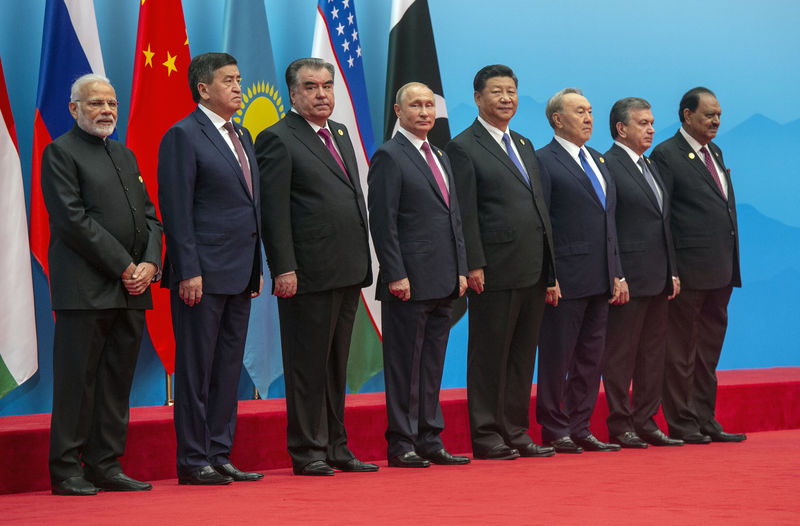 © Reuters. Russian President Vladimir Putin is seen during a photo session of the SCO Heads of State ahead of a meeting of the SCO Council of Heads of State in Qingdao
© Reuters. Russian President Vladimir Putin is seen during a photo session of the SCO Heads of State ahead of a meeting of the SCO Council of Heads of State in QingdaoSHANGHAI (Reuters) – State-run Chinese newspapers on Monday crowed about a weekend meeting of a regional security bloc hosted by China, painting it as a harmonious, anti-protectionist counterpoint to the G7 summit in Canada that was marred by acrimony.
The Global Times, a nationalistic tabloid run by the ruling Communist Party’s main newspaper, the People’s Daily, asked why the G7 had “ended in disarray” while the Shanghai Cooperation Organisation (SCO) summit in the port city of Qingdao was “full of enthusiasm and ambition”.
“The key lies in that the Shanghai Spirit, featuring mutual trust, mutual benefit, equality, consultation, respect for cultural diversity and pursuit of common development, echoes the theme of the era, in which unilateralism can hardly prevail,” it said.
It said criticism of the G7 meeting and praise for the SCO summit marked “an important change”.
In the Canadian province of Quebec at the weekend, U.S. President Donald Trump threw the G7’s efforts to show a united front into disorder by leaving early, backing out of a joint communique and taking aim at Canadian Prime Minister Justin Trudeau.
The SCO meeting in China at the same time, meanwhile, set what the China Daily newspaper said was a good example for multilateral cooperation, offering a “new vision” for a more just and equitable world.
“Against the backdrop of rising unilateralism and anti-globalization, the SCO’s opposition to trade protectionism in any form is especially encouraging,” the English-language daily in an editorial.
In a separate piece, the newspaper made the case for a united front against Trump after the G7 debacle.
“The G7 summit has served as another reminder that it is the Trump administration that is challenging the international rules-based order,” it said.
“Considering that the Trump administration has also instigated trade disputes with other countries such as China, the global backlash against Trump’s unilateralist tendencies is gaining momentum. The international community should rally and reject the self-oriented closed-door policies of the U.S.”
The SCO was launched in 2001 to combat radical Islam and other security concerns in China, Russia and four ex-Soviet Central Asian republics. It added two new members, India and Pakistan, last year and Iran has been seeking entry.
Fusion Media or anyone involved with Fusion Media will not accept any liability for loss or damage as a result of reliance on the information including data, quotes, charts and buy/sell signals contained within this website. Please be fully informed regarding the risks and costs associated with trading the financial markets, it is one of the riskiest investment forms possible.
Source: Investing.com


























